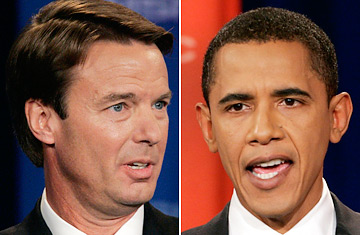
(l. to r.): Former Senator John Edwards; Senator Barack Obama
In the racing world it's called drafting — staying right behind the leader until she wears out and then vaulting past her right near the end. In the 2008 race for the Democratic presidential nomination, Hillary Clinton has two racers on her heels, and so far they have been working fairly well together. But as Clinton has begun to show signs of flagging, Barack Obama and John Edwards are now facing a difficult choice: continue to focus their attacks on the front-runner or go after each another to become what might be called the un-Hillary.
That battle to be the viable alternative for anti-Hillary Democrats is gradually emerging as the key campaign drama in the stretch run to the Iowa caucus. It's true that Obama and Edwards have both shown signs of progress of late, attacking Clinton as a polarizing or corrupt agent of the status quo: some 70% of likely Iowa Democratic caucus-goers are either undecided or not supporting Clinton. But most observers say there isn't room for three top-tier candidates, which means the two won't be able to play nice with each other for much longer.
"It is likely that the Democratic contest is going to come down to Hillary and the alternative to Hillary," said Peverill Squire, a political science professor at the University of Missouri. "Who becomes the alternative is the important question. In recent weeks Edwards and Obama have been focused on keeping Clinton from running off with the nomination. They may have succeeded in doing that, but neither of them has managed to become the Democrats' obvious other choice."
Perhaps sensing that, Obama took the first shot last week, telling the Washington Post: "Let me put it this way, if John wants to make the comparison between the work I did as a community organizer — or as a civil rights attorney or as a state senator taking on special interests — to him working as a trial lawyer making millions of dollars, I'm happy to have that discussion."
Edwards, when asked about the comment in a press conference the next day, shot back: "I've heard [Obama] talk about compromise and negotiation and bringing people together. I believe there's a fight in front of us. I don't believe that the defense contractors, the oil companies the pharmaceutical companies, et cetera, are going to give up their power willingly and I don't think we can sit around a table and be nice to them and they're going to relinquish the power that they have today. And that means you've got to have somebody who will fight. And I know that I will fight."
Taking the gloves off, however, is still a sensitive issue. Joe Trippi, Edwards' senior adviser, was quick to point out that Edwards was merely responding to a reporter's question. At the same time, Trippi noted that Edwards' criticisms of Clinton's lobbyist ties and his call for all Democrats to renounce contributions is somewhere Obama is too timid to follow. "This is where Obama will not go; he will not do this," Trippi said.
Edwards, however, may be under more pressure than Obama to go on the offensive. Even though Clinton may be faltering of late, Obama still commands an inordinate amount of media and voter attention, and Edwards' number three status may be starting to cost him backing. Jay Kleaveland signed up to chair Edwards' campaign in Clayton County, but Kleaveland recently withdrew his support, saying he wants to back someone he believes can win. Edwards "doesn't have the same effectiveness, that's the key word," Kleaveland said. "It like he's reading a legal brief; he doesn't have passion." A few other Edwards county chairs in Iowa, according to Politico.com, may also be defecting from his camp.
Still, both campaigns know that attacking each other this early is a dangerous move, especially since there is evidence that their united front is starting to have some effect. A Marist College poll of New Hampshire Democrats released over the weekend has Clinton ahead of Obama among likely primary voters in the state, 36%-25%, a lead that has narrowed significantly from her 41% to Obama's 20% in October. At the same time, a Boston Globe/University of New Hampshire poll of likely New Hampshire primary voters found Clinton down eight percentage points from 43% in September to 35% in September; Obama gained one percentage point to 21% and Edwards gained three percentage points to 15%. Meanwhile the most recent Zogby poll of likely Iowa caucus-goers found Clinton with 28%, down two percentage points from August, and Obama at 25%, up six percentage points.
"Both candidates are finding their voice now in opposition to the status quo," said Donna Brazile, who ran Al Gore's 2000 campaign and has not endorsed a candidate this cycle. "They are defining Clinton as 'more of the same.' There's still time to catch up with Clinton, but they must do so without trying to cancel each other out. In that race, Clinton scores a knockout."
The original version of this article incorrectly stated that Peverill Squire is currently a professor at Georgetown. Squire now teaches at the University of Missouri.
